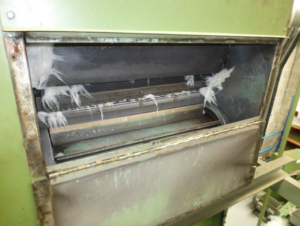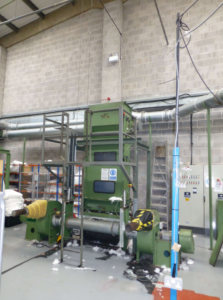Company fined £180k after woman’s hand had to be amputated
A Greater Manchester company has been fined £180k after a female employee lost her hand after it was dragged into a machine.
The Vita Cellular Foams (UK) Ltd employee was operating a blown line machine at the firm’s Oldham Road premises in Middleton on 30 June 2020, when one of her colleagues isolated it from the main power supply after it became blocked with fibres.
The then 23-year-old unscrewed a Perspex window in a bid to identify the blockage, but as she began to remove the fibres by hand, the machine still had some residual power and began to move again, drawing in her right hand.

The tragic incident resulted in three fingers being removed before she required further surgery to have her entire right hand amputated.
In a victim personal statement provided to Manchester Magistrates Court, the woman who is now 25, said the incident had completely changed her life.
“Before the accident, I was right-handed,” she said.
“I have now had to learn to do all of my daily activities again, including writing.
“This is a constant and daily reminder of what has happened to me and the ongoing impact it will have.”
The woman had to undergo four separate operations in a six-week period as well seeing trauma specialists for months after the amputation.
“The accident has deeply affected my life,” she added.
“I have a lot of triggers and am frightened easily by loud noises and bangs.
“I have nightmares at least once a night and don’t like talking or hearing about what happened.
“The accident has completely changed who I am as a person and I am not able to complete so many of the activities I could before, such as walking my dog.
“I am the complete opposite of the person I was before.”

An investigation by the Health and Safety Executive (HSE) found the company had no safe system of work in place for removing blockages from machines even though they were known to happen occasionally.
The Perspex window had been added to the machine some years previously to allow engineers and operators to identify blockages, but had not been fitted with an interlocking guard, so moving parts could be accessed through removal of this when the machine was running. Risk assessments had not been reviewed since the window’s addition to include the possibility of employees using it as a way to remove blockages, or to ensure that any excess energy in the machine was dispersed before it was accessed. The company should have ensured that tools were not readily accessible in order to remove the Perspex window.
Vita Cellular Foams (UK) Ltd of Oldham Road, Middleton, Greater Manchester pleaded guilty to breaching Section 2 (1) of the Health and Safety at Work etc. Act 1974. They were fined £180,000 and ordered to pay costs of £4,337.00 at Manchester Magistrates’ Court on 17 January 2023.
HSE inspector Lisa Bailey said: “This incident could so easily have been avoided.
“Employers should ensure they carry out an assessment of the risks and put in safe system of works for the operation of all machinery, particularly when clearing blockages.
“Employers should also ensure that adequate information, instruction and training is provided to all who use it.”
Notes to Editors:
- The Health and Safety Executive (HSE) is Britain’s national regulator for workplace health and safety. We prevent work-related death, injury and ill health through regulatory actions that range from influencing behaviours across whole industry sectors through to targeted interventions on individual businesses. These activities are supported by globally recognised scientific expertise.
- More information about the legislation referred to in this case is available.
- Further details on the latest HSE news releases is available.